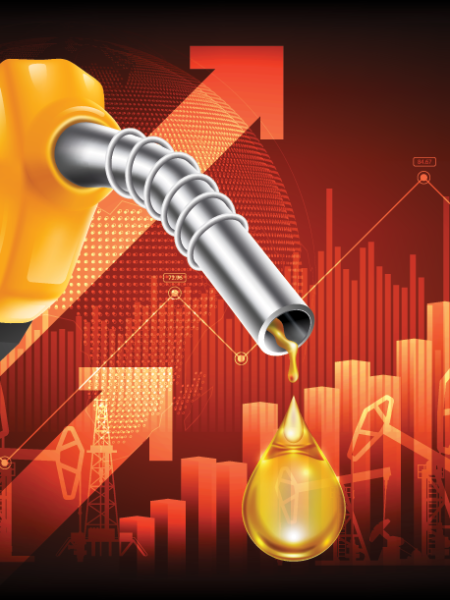

Diesel prices have consistently been on an upward trajectory, leaving fleet managers and diesel vehicle owners scrambling for strategies to maintain operational profitability. For industries that rely on diesel-powered fleets, such as transportation, construction, and agriculture, fuel often accounts for 30-40% of operating expenses. Rising costs not only strain budgets but force companies to make critical decisions that can impact service capacity or customer relationships.
While external factors affecting diesel prices might be beyond control, optimizing fuel efficiency offers a clear, actionable solution. Leveraging advanced fuel systems is no longer a luxury but a necessity for businesses seeking consistent performance, cost savings, and a competitive edge.
This blog explores the impact of rising diesel prices, inefficiencies in standard fuel systems, and how advanced technologies can mitigate these challenges.
When diesel prices surge, businesses face tough decisions:
None of these is ideal. Increasingly, businesses are turning to advanced solutions like fuel system optimization to offset costs without sacrificing productivity or customer satisfaction.
Even modern diesel engines often fall short of optimal fuel efficiency due to limitations in conventional fuel systems. These constraints include:
Particles, water, and other impurities in diesel fuel degrade engine performance. Contaminants damage injectors, reduce combustion efficiency, and ultimately drain fuel economy.
Air and vapor in fuel lines disrupt combustion efficiency, leading to wasted fuel and diminished power output. Without solutions like air separation systems, this issue can go unnoticed and cost businesses 3-7% of their fuel economy.
Fluctuations in fuel pressure to injectors can reduce spray efficiency, resulting in incomplete combustion. This not only wastes diesel but also accelerates wear on engine components.
Standard filtration systems accumulate contaminants over time, leading to fuel flow restrictions, inconsistent performance, and increased operational costs. These systems, though common, fail to address advanced fuel efficiency needs.
Advanced fuel systems, such as the AirDog® Heavy Duty Diesel Fuel System, address the inefficiencies of standard systems head-on. These systems integrate innovative features like fuel-water separation, air removal, and consistent fuel pressure regulation to optimize engine performance. Here’s how they deliver results:
Clean, contaminant-free fuel ensures complete combustion, squeezing more energy out of every gallon. For example, a heavy-duty truck consuming 20,000 gallons annually could save 1,000 gallons per year with just a 5% efficiency gain. At a national average of around $3.65 per gallon, that’s a direct savings of $3,650.
Modern injectors operate at extreme pressure, often exceeding 30,000 psi, which makes them highly susceptible to contamination damage. Replacing a single injector can cost $300-$1,000, and most engines have multiple injectors. Advanced filtration systems safeguard these components, significantly reducing maintenance costs.
Unlike standard filters that degrade as contaminants build up, advanced systems maintain steady fuel flow and pressure. This avoids the performance decline typical between service intervals, ensuring vehicles perform consistently.
Efficient fuel systems reduce the wear and tear on critical engine components, extending engine life. This translates to fewer breakdowns and longer replacement cycles, providing long-term cost savings and improved asset utilization.
For fleet managers considering advanced fuel systems, calculating the return on investment can solidify the business case.
These savings don’t include reduced maintenance costs and increased engine longevity, making the investment even more compelling.
Successfully adopting advanced fuel systems requires a structured approach:
While advanced fuel systems are essential, additional measures can further optimize fuel efficiency:
Every gallon of diesel conserved prevents approximately 22 pounds of CO2 emissions from entering the atmosphere. For a fleet of 20 vehicles, achieving a 5% fuel savings can reduce emissions by hundreds of tons annually. Not only does this align with sustainability goals, but it also positions companies favorably in an increasingly eco-conscious market.
1. What problems do AirDog® systems solve?
AirDog® systems eliminate fuel contamination, air entrainment, and pressure inconsistencies, ensuring clean, vapor-free fuel for optimal engine performance and efficiency.
2. How much can I save with an AirDog® system?
A 5% fuel efficiency improvement can save thousands annually per vehicle, with ROI typically achieved within 4-6 months.
3. Do AirDog® systems reduce maintenance costs?
Yes, by protecting injectors and other engine components from contaminants, AirDog® systems reduce wear, extend engine life, and lower maintenance expenses.
4. Are AirDog® systems easy to implement?
Yes, they come with straightforward installation kits and can be phased into fleets, starting with high-consumption vehicles for maximum impact.
Rising diesel prices demand actionable, sustainable solutions. Advanced fuel systems are a practical investment that yields immediate savings, reduces operational inefficiencies, and supports long-term business growth. For diesel-reliant industries, fuel efficiency isn’t just a competitive advantage; it’s an operational imperative.
Supercharge your fleet today by integrating high-performance systems like AirDog® for dependable, lasting results. The path to profitability starts with smarter operations, and optimized fuel systems are the first step.
